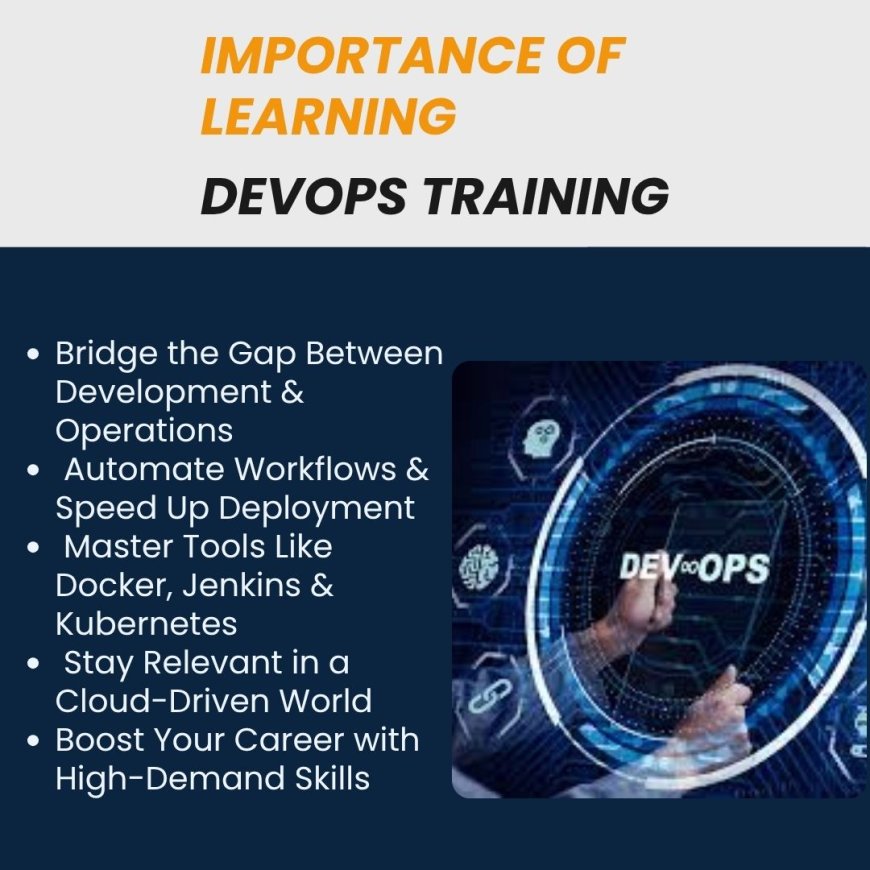What Makes DevOps a High-Demand Career Path in IT?
Discover why DevOps is a high-demand career in IT. Learn about its benefits, job roles, and the skills that make it essential in modern software development.

Introduction
In todays fast-paced digital landscape, the demand for skilled professionals who can bridge the gap between software development and IT operations is soaring. DevOps has emerged as a vital methodology that enables businesses to accelerate delivery, improve collaboration, and ensure system reliability. But what exactly makes DevOps a high-demand career path in IT? Lets explore the reasons behind its growing popularity, the skills required, and the career opportunities it opens.
Understanding DevOps: A Quick Overview
DevOps is a combination of Development and Operations. It is a culture and set of practices that integrates software development with IT operations to shorten the development life cycle and deliver high-quality software continuously.
DevOps emphasizes:
-
Automation of processes
-
Continuous integration and delivery (CI/CD)
-
Cross-functional collaboration
-
Infrastructure as code (IaC)
Rather than functioning in isolated silos, teams work together to ensure efficient, reliable, and secure software delivery.
Why Is DevOps in Such High Demand?
1. Business Need for Speed and Agility
Modern companies must innovate quickly to stay competitive. DevOps practices help teams release updates faster and with fewer errors. This agility enables businesses to respond promptly to market demands, user feedback, and security threats.
2. Widespread Adoption Across Industries
From finance and healthcare to e-commerce and entertainment, companies across sectors are adopting DevOps to modernize their IT infrastructure. This broad adoption creates a diverse range of career opportunities for trained professionals.
3. Growth in Cloud Computing
As organizations migrate to the cloud, there is a rising need for professionals who understand how to deploy and manage scalable infrastructure. DevOps skills, combined with knowledge of cloud platforms like AWS, Azure, or Google Cloud, are highly valuable in these environments.
4. Need for Automation and Efficiency
Manual processes are not sustainable for companies that release software frequently. DevOps promotes automation in testing, deployment, and monitoring, saving time and reducing the risk of human error.
5. Focus on Reliability and Quality
DevOps encourages continuous monitoring and feedback, which improves system reliability and user experience. Companies value professionals who can maintain high-quality standards while meeting tight deadlines.
Key Skills That Make DevOps Professionals Valuable
To thrive in a DevOps role, one must possess a mix of technical and soft skills. Here are the essential competencies:
1. Proficiency in Scripting and Automation
Languages like Bash, Python, and Groovy are frequently used in automating tasks and workflows.
2. Understanding of CI/CD Pipelines
Continuous Integration and Continuous Delivery are core to DevOps. Tools like Jenkins, GitLab CI, and CircleCI are used to automate build and deployment processes.
3. Cloud Infrastructure Management
Knowledge of cloud platforms is crucial for deploying scalable and reliable applications.
4. Containerization and Orchestration
Experience with Docker and Kubernetes is increasingly sought after, especially for microservices-based architectures.
5. Monitoring and Logging Tools
Using tools like Prometheus, Grafana, and ELK Stack helps ensure systems are running smoothly and issues are addressed proactively.
6. Collaboration and Communication
Since DevOps involves cross-team interactions, good communication and teamwork are essential.
DevOps Career Opportunities: Roles and Responsibilities
With DevOps being a core part of modern IT environments, the job market is rich with opportunities. Some common roles include:
1. DevOps Engineer
Responsible for automating development processes, maintaining CI/CD pipelines, and ensuring smooth deployment of applications.
2. Site Reliability Engineer (SRE)
Focuses on reliability, scalability, and performance of applications. Often works with infrastructure and monitoring systems.
3. Automation Engineer
Specializes in automating software testing, deployment, and infrastructure management.
4. Cloud DevOps Engineer
Works on deploying and managing applications in cloud environments, ensuring cost-efficiency and performance.
5. Build and Release Engineer
Manages software builds and coordinates code integration and releases across teams.
Salary Outlook and Job Growth
DevOps professionals enjoy competitive salaries due to the complexity and importance of their work. According to various industry reports, DevOps roles are among the top-paying jobs in IT.
Entry-level DevOps engineers can expect solid starting salaries.
Mid to senior-level professionals often command six-figure packages, especially with cloud and automation expertise.
The global DevOps market is projected to grow steadily, creating sustained job demand over the next decade.
How to Get Started with DevOps
If youre interested in pursuing a career in DevOps, heres a basic roadmap:
Understand the DevOps Philosophy Learn the core principles, tools, and cultural aspects.
Learn a Programming Language Start with Python, Shell, or another scripting language.
Explore Version Control Get hands-on experience with Git.
Familiarize Yourself with CI/CD Tools Tools like Jenkins, GitLab CI, and GitHub Actions are industry standards.
Learn About Containers and Cloud Platforms Practice using Docker, Kubernetes, and cloud environments.
Work on Real Projects Build practical skills by contributing to open-source or personal projects.
Final Thoughts
The rapid evolution of technology, increased demand for automation, and the shift to cloud-native infrastructure have made DevOps training in chandigarh a high-demand career path in IT. For individuals with a passion for technology, problem-solving, and continuous improvement, DevOps offers a dynamic and rewarding career. Whether you're just starting your IT journey or looking to upskill, mastering DevOps can open doors to exciting roles and long-term growth in the tech industry.
Q1: What is DevOps, and how is it different from traditional IT roles?
A: DevOps is a combination of development and operations practices aimed at automating and integrating the processes between software development and IT teams. Unlike traditional IT roles that work in silos, DevOps emphasizes collaboration, continuous integration/deployment (CI/CD), and faster delivery of applications.
Q2: Why is DevOps considered a high-demand skill in the IT industry?
A: DevOps is in high demand because it helps companies release software faster, reduce bugs, and increase operational efficiency. As businesses shift to cloud computing and agile workflows, they need DevOps professionals to manage infrastructure, automate processes, and ensure continuous delivery.
Q3: What are the key skills required to build a career in DevOps?
A: Core DevOps skills include proficiency in scripting (e.g., Bash, Python), version control (Git), CI/CD tools (Jenkins, GitLab CI), containerization (Docker), orchestration (Kubernetes), cloud platforms (AWS, Azure), and strong problem-solving and collaboration abilities.
Q4: What kind of job roles can I pursue with DevOps knowledge?
A: With DevOps expertise, you can explore roles such as DevOps Engineer, Site Reliability Engineer (SRE), Automation Engineer, Cloud DevOps Engineer, Build & Release Engineer, and Infrastructure Engineereach offering unique responsibilities and growth potential.
Q5: How can a beginner start learning DevOps effectively?
A: Beginners can start by learning basic scripting, understanding version control (Git), exploring Linux fundamentals, and practicing with tools like Jenkins and Docker. Working on real-world projects and familiarizing oneself with cloud services also accelerates practical understanding.
































